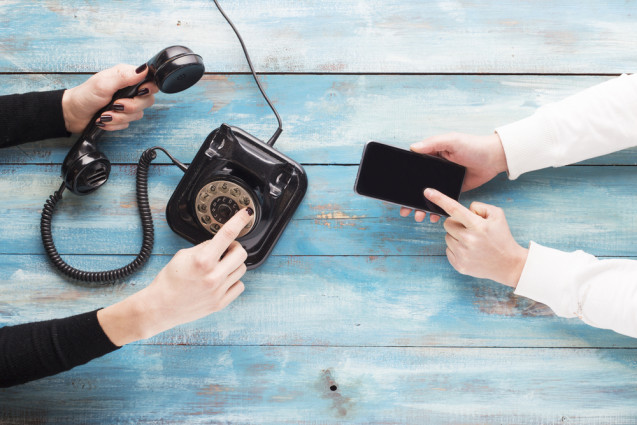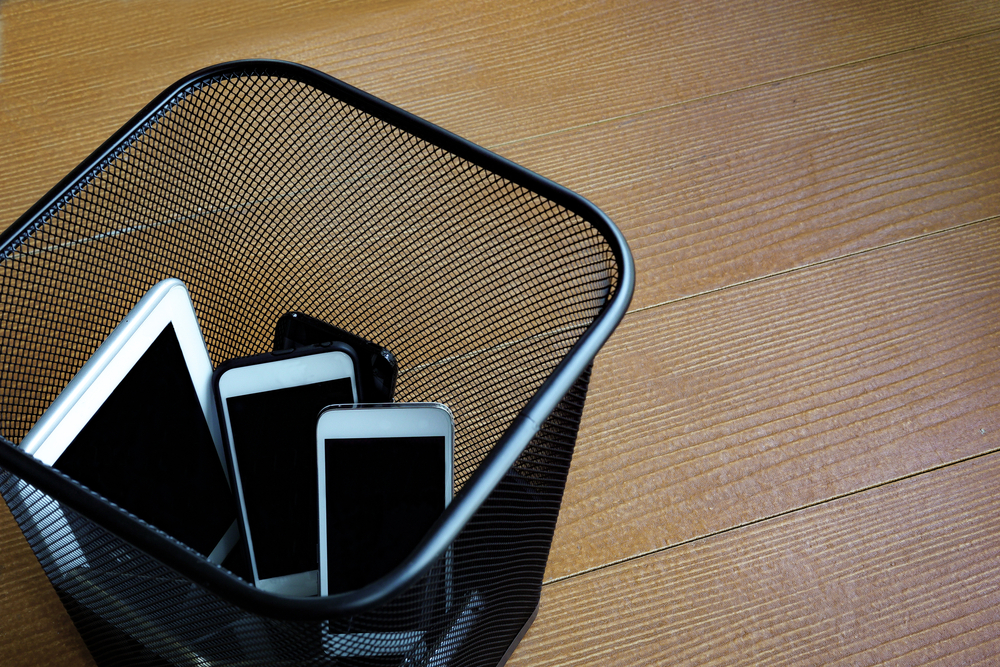Technological evolution: who hasn’t heard of this yet? It brings happiness into our lives, more convenience and less cumbersome usage, more and more possibilities for the user… Why make life (more) difficult when it can be made so (much more) convenient?
Just look at a communication device that you cannot ignore anymore, even if you wanted to: the smart phone. For the younger generation, it’s as if a cybernetic system is prosthetically attached to their arms; resisting it is futile! And they want their phones to become smarter and smarter, taking over more and more functions of their daily lives.
Now this is, of course, heaven for manufacturers: they can all battle to find new unique money-making features to add… or to make one that already exists much better. Likewise for the developers of dedicated apps (think, for example mobile banking). Innovation to make our daily lives “easier and easier”, basically a one-click life.
With the technology evolving at an ever faster pace, and an increasing focus on being the first to have the latest selling point, thoughts of security tend to be secondary, at best. This creates more possibilities for hackers, those that want to steal information, eavesdrop, etc. As these new features are introduced more and more often, and with more and more haste, in the smarter phones, so the probability of zero-day exploits becomes higher.
It seems that with the speed of technological evolution, the “urge” of people to use new features as soon as possible – even though they may not even exist right now and while these tasks can already be done in ‘the old way’ – is unstoppable. And at the same time we complain about data leakage, data loss, lack of privacy and insecure operating systems.
Maybe it is time to press pause and make it all secure, or more secure, dial back on the technological potential technological possibilities – making devices more controllable. There is definitely a demand for that, too. Just last week the Dutch Government announced that officials must switch to dumb(er) phones, deliberately equipped with low-tech specifications, making it harder for hackers to intercept them. The new phones only can be used for calls or SMS; they lack the ability to install apps or connect to the internet (I still remember those (brick) phones from the late 90’s!). While the prime-minister and some ministers already use such a device, others will have to “abandon” their current mobile phones when travelling to specific countries or regions and will be issued with such a low-tech phone and urged to leave their regular phone at home. This should make communication secure, or at least less insecure', since the replacement mobile phone has been prepared, checked and certified by the Dutch Secret Service. A great step back, getting rid of security by obscurity, and prioritizing safety over features.
The example of the Dutch Government is not an isolated incident, it seems to become a trend. Earlier this year, the White House banned personal cell phones from the West Wing, citing security concerns. Staff will be able to continue to carry out their business on government-issued devices.
But of course it is not only the device that needs to be more secure. You, the user of the device, have to be aware of security issues too, such as not taking a personal phone with you on business trips, but also making and receiving calls with your secure phone in a secure environment, making sure that there are no cameras or listening devices, and no windows conveniently nearby so that lip-readers can do their job. And then making sure you whisper as the walls in the hotel may be thin, and… Oh wait… Remote laser vibration sensors can decode the audio! Best to go into the hotel room bathroom, close the door (they tend to have some soundproofing), turn on the shower and stand quite close to it while calling… Am I getting paranoid?
By all means, let’s not get too James Bond-ishly paranoid. For politicians, top managers of large multinationals dealing with sensitive information that could affect stock markets, those who deal with (trade) secrets and intellectual property: this may be an issue and they should take the necessary precautions. But revert completely to using only a dumb phone, even for normal calls asking, for example, how grandmother is doing?
Just remember that in the past, listening in on calls made on the analog telephone system with no encryption was really easy. Technology brought us a long way ahead, but perhaps a bit too fast. A small step back, made by securing the current “standard”, is more feasible than complete eradication of what has been created and accepted as a normal part of our daily lives. Such a complete reversion would not even be considered acceptable anymore if we were to disallow commonly-used devices.
Are you going to tell your teenage and pre-teenage children that a hot-off-the-press-release model smartphone with the newest features is now prohibited, and an old phone that can only call/text is all that's available? They will be angry, feel ashamed of their old-fashioned parents, and will not go out anymore as they refuse to have their friends see them with such a simplistic, dumb phone. As they will not be able to interact with their friends anymore, because social media apps do not exist for their dumb phone (and since they won’t leave the house anymore), they will have to talk to you again.
Wait a minute??? Kids that start to talk to their parents again… But that's a good thing! Where can I get one of these phones?!






